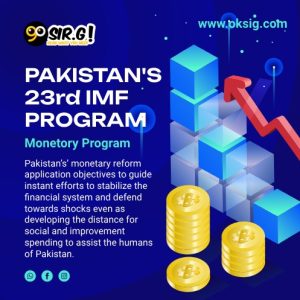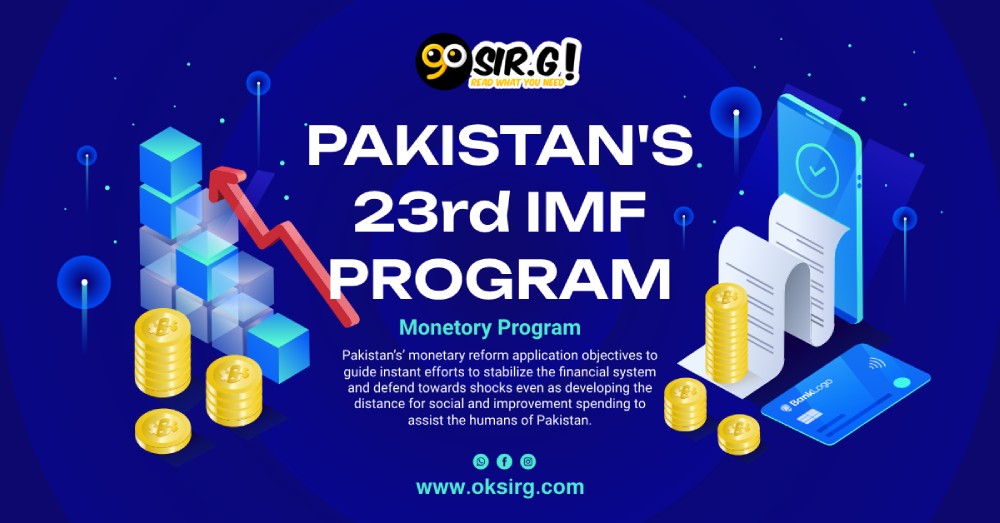Pakistan’s 23rd IMF program aims to achieve economic stabilization through the implementation of structural reforms. Furthermore, ultimately leads to poverty reduction and sustainable economic growth.
Pakistan’s participation in the International Monetary Fund (IMF) is a recurring theme in the country’s economic landscape. The recently approved 23rd IMF program holds both promise and challenges for Pakistan’s financial future. This article examines the expected benefits and potential obstacles Pakistan faces in its program to stabilize the economy. Moreover, promote growth and structural reforms.
Economic Stabilization And Financial Support:
One of the key benefits expected from Pakistan’s 23rd IMF program is economic stabilization. The program provides the country with much-needed financial support to address macroeconomic imbalances, particularly in areas such as budget deficits, current account deficits and foreign exchange reserves. The IMF program aims to restore stability by implementing sound fiscal policies. Furthermore, improving revenue generation and strengthening the country’s position in external relations.
Increase Investor Confidence:
Successful implementation of the IMF program could help restore investor confidence in the Pakistani economy. By demonstrating its commitment to reform and macroeconomic stability, Pakistan has the potential to attract domestic and foreign investment. Increased investor confidence can lead to job creation, technological advances and overall economic growth. Moreover, paving the way for a more prosperous future.
Structural Reforms For Long-Term Sustainable Development:
The IMF’s 23rd program underscores the need for structural reforms to address the long-term challenges facing Pakistan’s economy. These reforms include measures to streamline tax administration and improve governance and transparency. Strengthen the financial sector and promote sustainable economic growth. By implementing these reforms, Pakistan aims to lay a solid foundation for long-term economic stability and reduce its dependence on foreign credit.
Social Security And Poverty Reduction:
Despite the potential short-term challenges of structural reforms, the IMF program also underscores the importance of social safety nets and poverty reduction measures. The program aims to protect vulnerable social groups through targeted social spending. Cash transfers and better access to basic services such as health care and education. These initiatives can help mitigate the negative impact of reforms and create a more inclusive and just society.
External And Internal Challenges:
While the IMF’s 23rd program has many potential benefits, it also presents significant challenges. Externally, Pakistan faces threats such as global economic uncertainty, commodity price volatility and geopolitical tensions that could hamper the program’s success. Domestic political stability, effective policy implementation and stakeholder resistance to reform are hurdles that must be overcome for the program to be successful.
Follow-Up And Implementation:
Effective monitoring and implementation of the IMF program are critical to achieving the expected benefits. Transparency, accountability and rapid implementation of reforms are essential. In addition, capacity building within government institutions, enhancing coordination between different stakeholders and fostering robust governance mechanisms will be key to overcoming implementation challenges and maintaining program momentum.
Pakistan’s 23rd IMF program offers an important opportunity to address economic imbalances, promote sustainable growth and undertake important structural reforms. Expected benefits include economic stabilization, increased investor confidence and improved social safety nets. However, challenges such as external threats, internal obstacles and effective implementation require careful management and strong commitment. Pakistan’s ability to meet these challenges and successfully implement the IMF’s program will play a key role in shaping the country’s economic future and paving the way for a more stable. Moreover, inclusive and prosperous Pakistan.
FAQS!
Q: What is the 23rd IMF program in Pakistan?
A: The 23rd IMF program refers to the recent agreement between Pakistan and the International Monetary Fund (IMF) to address economic imbalances, implement structural reforms and stabilize the country’s economy. It describes a set of policies and measures to promote fiscal discipline, improve governance and support sustainable economic growth.
Q: What benefits are expected from the IMF’s 23rd program in Pakistan?
A: Expected benefits of the IMF’s 23rd program in Pakistan include economic stabilization, financial support to address macroeconomic imbalances, improved investor confidence, structural reforms for long-term sustainability, and targeted poverty reduction efforts and social safety nets.









Leave feedback about this
You must be logged in to post a comment.